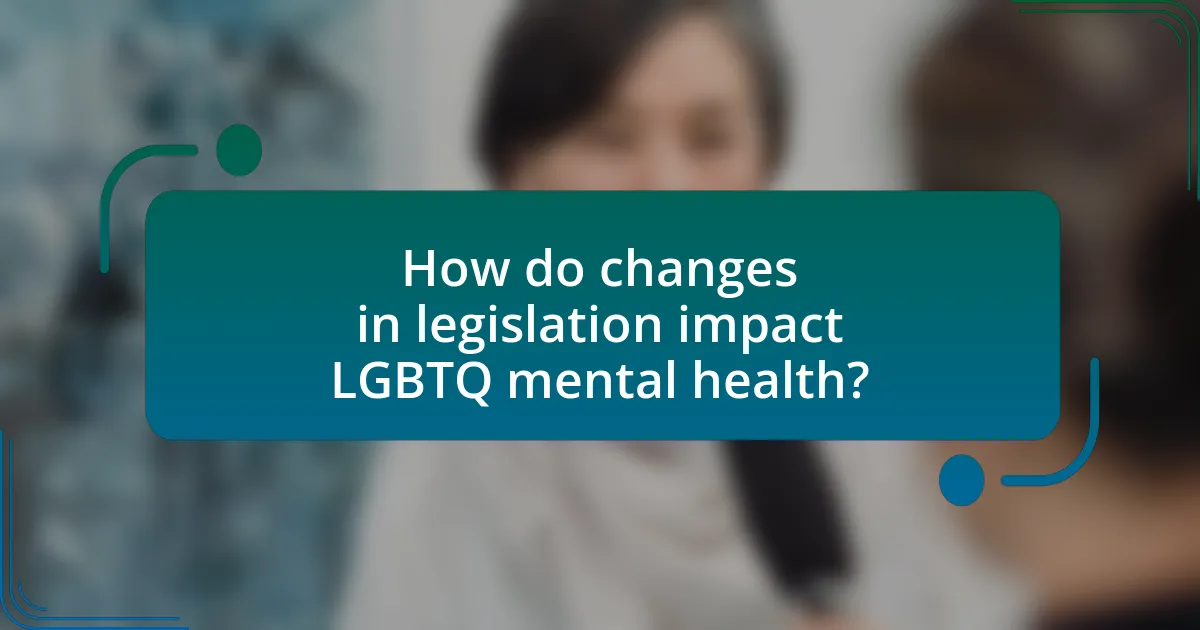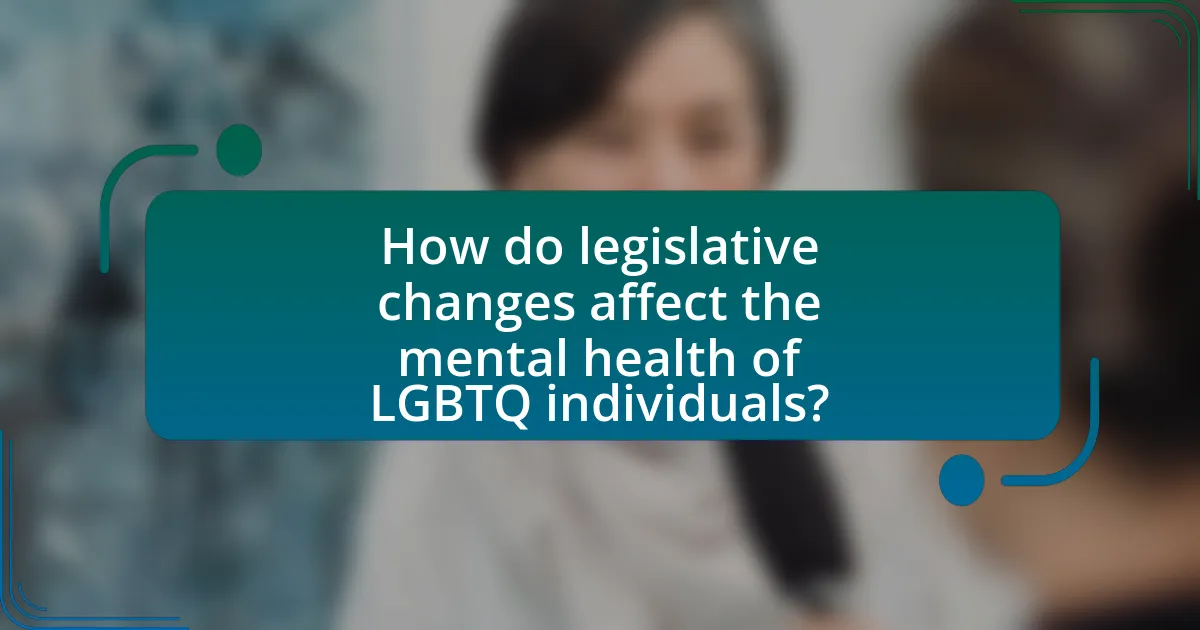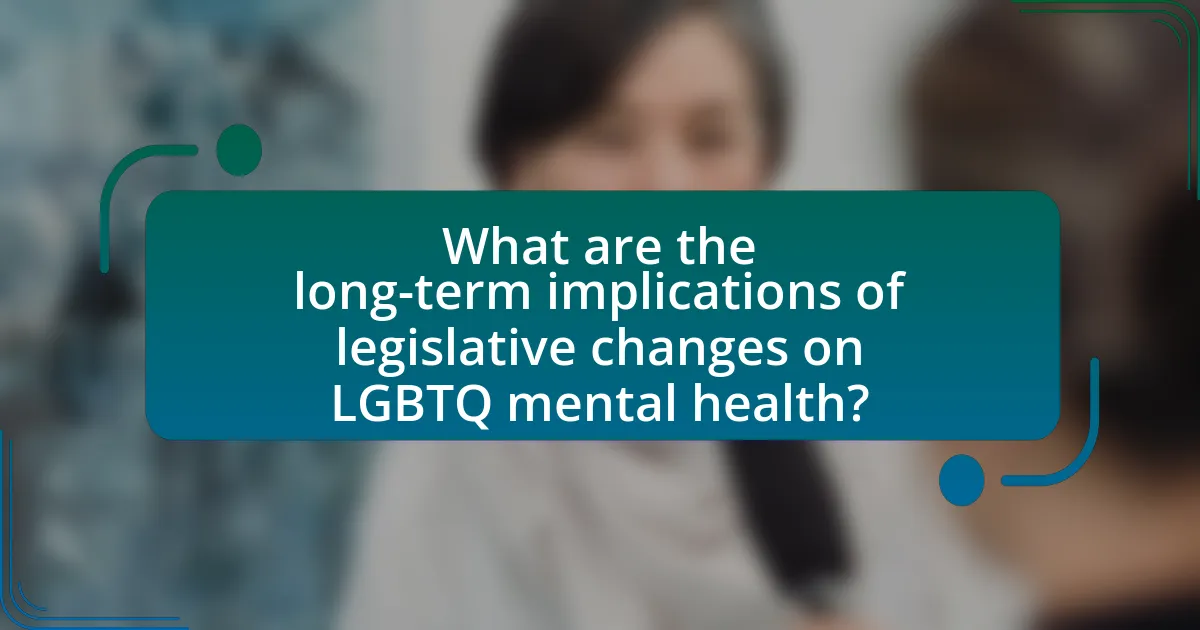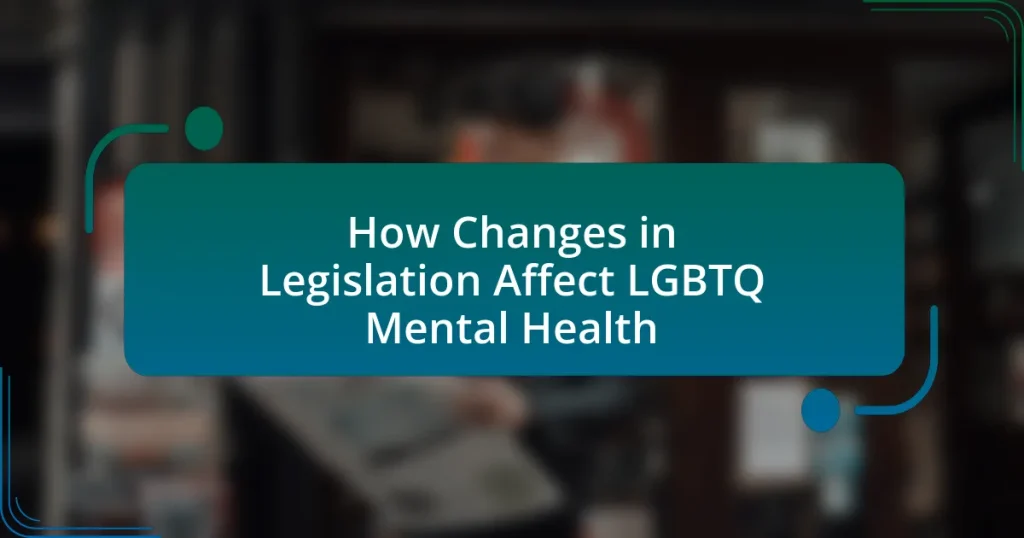The article examines the significant impact of legislative changes on the mental health of LGBTQ individuals, highlighting how laws can either enhance or undermine their well-being. It discusses specific legislative developments, such as the legalization of same-sex marriage and anti-discrimination laws, and their correlation with improved mental health outcomes, including reduced rates of suicide and anxiety. The article also addresses the detrimental effects of restrictive legislation, particularly in regions with anti-LGBTQ laws, which contribute to increased mental health challenges. Furthermore, it emphasizes the role of advocacy groups in influencing legislation and the importance of understanding the relationship between legal frameworks and mental health to foster a supportive environment for LGBTQ communities.

How do changes in legislation impact LGBTQ mental health?
Changes in legislation significantly impact LGBTQ mental health by influencing societal acceptance and access to resources. For instance, the legalization of same-sex marriage in various countries has been associated with decreased rates of mental health issues among LGBTQ individuals, as evidenced by a study published in the American Journal of Public Health, which found that states allowing same-sex marriage saw a 7% reduction in suicide rates among LGBTQ youth. Conversely, legislation that restricts LGBTQ rights, such as anti-transgender laws, can exacerbate feelings of marginalization and increase mental health challenges, as reported by the Trevor Project’s National Survey on LGBTQ Youth Mental Health, which indicated that 40% of transgender and non-binary youth seriously considered suicide in states with restrictive policies. Thus, legislative changes play a crucial role in shaping the mental health landscape for LGBTQ individuals.
What specific legislative changes have been observed in recent years?
Recent years have seen significant legislative changes aimed at enhancing LGBTQ rights and protections. For instance, the legalization of same-sex marriage in numerous countries, including the United States in 2015 through the Supreme Court ruling in Obergefell v. Hodges, has provided legal recognition and benefits to LGBTQ couples. Additionally, various states have enacted laws prohibiting discrimination based on sexual orientation and gender identity in employment, housing, and public accommodations, such as the Equality Act proposed in the U.S. Congress. These legislative changes contribute to improved mental health outcomes for LGBTQ individuals by fostering a more inclusive and supportive environment, as evidenced by studies indicating that legal recognition and anti-discrimination protections correlate with lower rates of mental health issues within the community.
How do these changes vary by region or country?
Changes in legislation affecting LGBTQ mental health vary significantly by region and country, influenced by cultural, social, and legal contexts. For instance, countries like Canada and the Netherlands have implemented comprehensive anti-discrimination laws and marriage equality, leading to improved mental health outcomes for LGBTQ individuals, as evidenced by lower rates of depression and anxiety reported in studies conducted by the Canadian Mental Health Association. In contrast, regions such as Eastern Europe and parts of Africa often have restrictive laws against LGBTQ rights, resulting in higher levels of stigma and mental health issues, as highlighted by research from the International Lesbian, Gay, Bisexual, Trans and Intersex Association, which shows that individuals in these areas experience increased rates of suicidal ideation and psychological distress. Thus, the impact of legislative changes on LGBTQ mental health is profoundly shaped by the regional legal landscape and societal attitudes.
What types of legislation are most influential on LGBTQ mental health?
Anti-discrimination legislation, marriage equality laws, and policies regarding healthcare access are the most influential types of legislation on LGBTQ mental health. Anti-discrimination laws, such as the Equality Act in the United States, protect LGBTQ individuals from discrimination in employment, housing, and public accommodations, which can significantly reduce stress and anxiety associated with social stigma. Marriage equality laws, like the Obergefell v. Hodges ruling, have been shown to improve mental health outcomes by providing legal recognition and social acceptance, leading to lower rates of depression and suicidal ideation among LGBTQ individuals. Additionally, healthcare policies that ensure access to mental health services and gender-affirming care are crucial, as studies indicate that access to appropriate healthcare correlates with improved mental health outcomes in LGBTQ populations.
Why is understanding the relationship between legislation and mental health important?
Understanding the relationship between legislation and mental health is crucial because laws directly influence access to mental health services and protections for individuals. For instance, legislation that promotes anti-discrimination policies can significantly improve mental health outcomes for marginalized groups, including the LGBTQ community, by reducing stigma and increasing access to supportive resources. Research indicates that supportive legal frameworks correlate with lower rates of mental health issues among LGBTQ individuals, highlighting the importance of legislative measures in fostering a healthier society.
What are the potential consequences of neglecting this relationship?
Neglecting the relationship between changes in legislation and LGBTQ mental health can lead to significant adverse outcomes. These consequences include increased rates of mental health issues such as depression and anxiety among LGBTQ individuals, as evidenced by studies indicating that legal protections correlate with improved mental health outcomes. For instance, research published in the American Journal of Public Health shows that states with more inclusive policies report lower rates of suicide attempts among LGBTQ youth. Additionally, neglecting this relationship can perpetuate systemic discrimination, leading to social isolation and reduced access to mental health resources, further exacerbating mental health disparities within the community.
How can awareness of this relationship lead to better mental health outcomes?
Awareness of the relationship between legislative changes and LGBTQ mental health can lead to better mental health outcomes by fostering an environment of acceptance and support. When individuals understand how laws impact the rights and well-being of LGBTQ communities, they are more likely to advocate for inclusive policies that reduce stigma and discrimination. Research indicates that supportive legislation, such as anti-discrimination laws, correlates with lower rates of mental health issues among LGBTQ individuals. For instance, a study published in the American Journal of Public Health found that states with more inclusive policies reported significantly lower rates of suicide attempts among LGBTQ youth. This evidence underscores the importance of awareness in promoting mental health through legislative advocacy and community support.
What role do advocacy groups play in influencing legislation?
Advocacy groups play a crucial role in influencing legislation by mobilizing public opinion, providing expert testimony, and lobbying lawmakers. These organizations often represent marginalized communities, such as the LGBTQ population, and work to ensure that their needs and rights are addressed in legislative processes. For instance, the Human Rights Campaign has been instrumental in advocating for policies that protect LGBTQ rights, contributing to the passage of significant legislation like the Equality Act. Their efforts include grassroots campaigns, educational initiatives, and strategic partnerships, which collectively enhance their ability to shape laws that directly impact the mental health and well-being of LGBTQ individuals.
How do these groups address mental health issues within the LGBTQ community?
Groups addressing mental health issues within the LGBTQ community provide targeted support through counseling, advocacy, and education. Organizations like the Trevor Project and the Human Rights Campaign offer crisis intervention services, mental health resources, and training for mental health professionals to better understand LGBTQ-specific challenges. Research indicates that LGBTQ individuals face higher rates of mental health issues, with studies showing that 39% of LGBTQ youth seriously consider suicide, highlighting the need for specialized support. These groups also work to influence legislation that protects LGBTQ rights, which can lead to improved mental health outcomes by fostering a more inclusive and supportive environment.
What strategies do they use to promote legislative change?
Advocacy groups employ several strategies to promote legislative change, including grassroots mobilization, coalition building, and targeted lobbying efforts. Grassroots mobilization involves engaging community members to raise awareness and pressure lawmakers through campaigns, demonstrations, and social media outreach. Coalition building brings together diverse organizations to amplify their collective voice and resources, enhancing their influence on policy discussions. Targeted lobbying efforts focus on directly engaging legislators through meetings, providing research and data to support their positions, and mobilizing constituents to contact their representatives. For instance, the Human Rights Campaign has effectively utilized these strategies to advocate for policies that protect LGBTQ rights, demonstrating the impact of organized efforts on legislative outcomes.

How do legislative changes affect the mental health of LGBTQ individuals?
Legislative changes significantly impact the mental health of LGBTQ individuals by either affirming their rights or perpetuating discrimination. For instance, the legalization of same-sex marriage in the United States in 2015 led to improved mental health outcomes for LGBTQ individuals, as studies indicated a decrease in suicide rates and increased overall well-being. Conversely, laws that restrict LGBTQ rights, such as those banning gender-affirming care for transgender youth, have been linked to increased rates of anxiety, depression, and suicidal ideation among affected individuals. Research published in the American Journal of Public Health highlights that supportive policies contribute to lower mental health disparities within the LGBTQ community, demonstrating the direct correlation between legislative environments and mental health outcomes.
What are the psychological effects of supportive versus discriminatory legislation?
Supportive legislation positively impacts psychological well-being, while discriminatory legislation leads to adverse mental health outcomes. Research indicates that supportive laws, such as marriage equality and anti-discrimination protections, correlate with lower rates of depression, anxiety, and suicidal ideation among LGBTQ individuals. For instance, a study published in the American Journal of Public Health found that states with marriage equality laws reported a 7% decrease in suicide rates among LGBTQ youth. Conversely, discriminatory legislation fosters stigma and marginalization, contributing to increased psychological distress, social isolation, and higher rates of mental health issues. A report from the Williams Institute highlights that LGBTQ individuals living in states with discriminatory laws experience significantly higher levels of psychological distress compared to those in supportive environments.
How does supportive legislation contribute to positive mental health outcomes?
Supportive legislation contributes to positive mental health outcomes by creating an environment that fosters acceptance, reduces stigma, and ensures access to necessary resources for individuals, particularly within marginalized communities such as LGBTQ populations. For instance, laws that prohibit discrimination based on sexual orientation or gender identity can lead to increased feelings of safety and belonging, which are critical for mental well-being. Research indicates that states with comprehensive anti-discrimination laws report lower rates of mental health issues among LGBTQ individuals, highlighting the direct correlation between supportive legal frameworks and improved mental health outcomes.
What are the mental health risks associated with discriminatory laws?
Discriminatory laws pose significant mental health risks, particularly for marginalized groups such as the LGBTQ community. These laws can lead to increased levels of anxiety, depression, and suicidal ideation due to the social stigma and systemic oppression they perpetuate. Research indicates that individuals living in environments with discriminatory legislation experience higher rates of mental health disorders; for instance, a study published in the American Journal of Public Health found that LGBTQ individuals in states with anti-LGBTQ laws reported 2.5 times higher rates of mental distress compared to those in more inclusive states. This correlation underscores the detrimental impact of legal discrimination on mental well-being, highlighting the urgent need for legislative reform to protect vulnerable populations.
How do changes in legislation influence access to mental health resources?
Changes in legislation significantly influence access to mental health resources by establishing funding, regulations, and protections that directly affect service availability. For instance, the Mental Health Parity and Addiction Equity Act of 2008 mandated that mental health services be covered by insurance plans at the same level as physical health services, thereby increasing access to necessary care. Additionally, legislation that prohibits discrimination based on sexual orientation or gender identity can enhance access for LGBTQ individuals, as it encourages inclusive practices within healthcare settings. Studies indicate that states with more comprehensive mental health laws report higher rates of service utilization among LGBTQ populations, demonstrating a clear link between legislative changes and improved access to mental health resources.
What barriers do LGBTQ individuals face in accessing mental health care?
LGBTQ individuals face multiple barriers in accessing mental health care, including stigma, discrimination, and lack of culturally competent providers. Stigma surrounding mental health issues can deter LGBTQ individuals from seeking help, as they may fear judgment or rejection. Discrimination within healthcare settings can manifest as biased treatment or outright refusal of care, leading to a lack of trust in mental health services. Additionally, many mental health providers lack training in LGBTQ-specific issues, which can result in inadequate care and further alienation. According to a study published in the American Journal of Public Health, LGBTQ individuals are more likely to experience mental health disparities due to these barriers, highlighting the urgent need for improved access and support in mental health care for this population.
How can legislation improve access to mental health services for LGBTQ individuals?
Legislation can improve access to mental health services for LGBTQ individuals by mandating non-discrimination policies and funding targeted mental health programs. Non-discrimination laws ensure that LGBTQ individuals receive equitable treatment in healthcare settings, reducing barriers to accessing necessary services. For instance, the Affordable Care Act prohibits discrimination based on sexual orientation and gender identity, which has led to increased access to mental health care for LGBTQ populations. Additionally, legislation that allocates funding for mental health initiatives specifically aimed at LGBTQ individuals can address unique mental health challenges faced by this community, such as higher rates of depression and anxiety. Studies indicate that LGBTQ individuals are more likely to experience mental health issues due to stigma and discrimination, highlighting the need for supportive legislative measures.
What is the impact of public perception shaped by legislation on LGBTQ mental health?
Public perception shaped by legislation significantly impacts LGBTQ mental health by influencing societal attitudes and acceptance. Positive legislative changes, such as the legalization of same-sex marriage, have been associated with improved mental health outcomes in LGBTQ individuals, as evidenced by a study published in the American Journal of Public Health, which found a 7% decrease in suicide attempts among LGBTQ youth following such legal reforms. Conversely, negative legislation, such as anti-LGBTQ laws, can exacerbate stigma and discrimination, leading to increased rates of anxiety, depression, and suicidal ideation within the community. Research from the Williams Institute indicates that LGBTQ individuals living in states with more supportive laws report better mental health and lower levels of psychological distress compared to those in less supportive environments. Thus, the interplay between public perception and legislation plays a crucial role in shaping the mental health landscape for LGBTQ individuals.
How does legislation affect societal attitudes towards LGBTQ individuals?
Legislation significantly influences societal attitudes towards LGBTQ individuals by establishing legal recognition and protections that validate their rights and identities. For instance, the legalization of same-sex marriage in various countries has been associated with increased acceptance and reduced stigma towards LGBTQ communities, as evidenced by a 2019 study published in the Journal of Marriage and Family, which found that states in the U.S. that legalized same-sex marriage saw a notable decline in anti-LGBTQ hate crimes. Furthermore, anti-discrimination laws contribute to a more inclusive environment, fostering positive societal perceptions and reducing prejudice. This correlation between legal frameworks and societal attitudes underscores the role of legislation in shaping public opinion and promoting equality for LGBTQ individuals.
What role does media representation play in shaping these perceptions?
Media representation plays a crucial role in shaping perceptions of LGBTQ individuals by influencing societal attitudes and beliefs. Positive and accurate portrayals in television, film, and news can foster acceptance and understanding, while negative or stereotypical representations can perpetuate stigma and discrimination. Research indicates that exposure to positive media representations correlates with increased support for LGBTQ rights and improved mental health outcomes within the community. For instance, a study published in the Journal of Homosexuality found that individuals who consume media with positive LGBTQ representation report higher levels of acceptance and lower levels of internalized homophobia. Thus, media representation significantly impacts public perceptions and, consequently, the mental health of LGBTQ individuals.

What are the long-term implications of legislative changes on LGBTQ mental health?
Legislative changes significantly impact LGBTQ mental health by either enhancing or undermining the community’s sense of safety, acceptance, and well-being. For instance, the legalization of same-sex marriage in various countries has been associated with decreased rates of depression and anxiety among LGBTQ individuals, as evidenced by a study published in the American Journal of Public Health, which found a 7% reduction in mental health issues following such legal recognition. Conversely, laws that restrict LGBTQ rights, such as anti-transgender legislation, can lead to increased stigma and discrimination, resulting in higher rates of mental health disorders, as reported by the Trevor Project’s National Survey on LGBTQ Youth Mental Health. These long-term implications underscore the critical role that supportive legislation plays in fostering positive mental health outcomes for LGBTQ individuals.
How do legislative changes affect the overall well-being of LGBTQ communities?
Legislative changes significantly impact the overall well-being of LGBTQ communities by either enhancing or undermining their rights and protections. For instance, the legalization of same-sex marriage in the United States in 2015 led to increased mental health outcomes for LGBTQ individuals, as studies indicated a reduction in psychological distress and improved life satisfaction among same-sex couples. Conversely, the introduction of discriminatory laws, such as those restricting transgender individuals’ access to healthcare, has been linked to increased rates of anxiety, depression, and suicidal ideation within these communities. Research from the Williams Institute shows that supportive legislation correlates with lower rates of mental health issues, highlighting the critical role that legal recognition and protection play in fostering a healthier environment for LGBTQ individuals.
What trends can be observed in mental health statistics following legislative changes?
Following legislative changes, particularly those aimed at enhancing LGBTQ rights, there is a notable trend of improved mental health statistics within the LGBTQ community. For instance, studies have shown that the legalization of same-sex marriage in various countries correlates with a significant decrease in suicide rates among LGBTQ youth. Research published in the American Journal of Public Health indicated that states in the U.S. that legalized same-sex marriage experienced a 7% reduction in suicide attempts among LGBTQ adolescents. Additionally, increased anti-discrimination laws have been linked to lower levels of anxiety and depression among LGBTQ individuals, as evidenced by surveys conducted by organizations such as the Human Rights Campaign, which reported improved overall mental well-being in states with comprehensive protections. These trends highlight the positive impact of legislative changes on the mental health of LGBTQ individuals.
How do these changes influence future legislative efforts?
Changes in legislation regarding LGBTQ rights significantly influence future legislative efforts by establishing precedents that shape public policy and societal norms. For instance, the legalization of same-sex marriage in various countries has led to increased advocacy for comprehensive anti-discrimination laws, demonstrating a direct correlation between legislative milestones and subsequent policy initiatives. This pattern is supported by research indicating that legal recognition of LGBTQ rights contributes to improved mental health outcomes within the community, thereby prompting lawmakers to prioritize mental health legislation that addresses specific needs of LGBTQ individuals. Consequently, as successful legislative changes are enacted, they create a framework that encourages further advancements in LGBTQ rights and protections, fostering an environment conducive to ongoing legislative efforts.
What can be done to mitigate negative impacts of legislation on LGBTQ mental health?
To mitigate negative impacts of legislation on LGBTQ mental health, advocacy for inclusive policies and legal protections is essential. Research indicates that supportive legislation, such as anti-discrimination laws, significantly reduces mental health issues within LGBTQ populations. For instance, a study published in the American Journal of Public Health found that states with comprehensive non-discrimination laws reported lower rates of suicide attempts among LGBTQ youth. Additionally, providing mental health resources tailored to the LGBTQ community can help address the specific challenges they face due to adverse legislation. Access to affirming healthcare and community support networks also plays a critical role in enhancing resilience and well-being among LGBTQ individuals affected by harmful laws.
What role can mental health professionals play in this process?
Mental health professionals play a crucial role in addressing the mental health needs of LGBTQ individuals affected by changes in legislation. They provide support through therapy, advocacy, and education, helping clients navigate the emotional and psychological impacts of legal changes that may affect their rights and well-being. Research indicates that supportive mental health interventions can mitigate the negative effects of discrimination and stigma, which are often exacerbated by legislative shifts. For instance, a study published in the American Journal of Public Health found that access to affirming mental health care significantly improves the mental health outcomes of LGBTQ individuals facing legal challenges.
How can community support systems be strengthened in response to legislative changes?
Community support systems can be strengthened in response to legislative changes by enhancing collaboration among local organizations, increasing funding for mental health services, and implementing targeted outreach programs. Collaborative efforts among nonprofits, healthcare providers, and advocacy groups can create a unified response to new laws, ensuring that resources are effectively allocated. Increased funding can facilitate the development of specialized mental health services that address the unique challenges faced by the LGBTQ community, particularly in light of legislative shifts that may impact their rights and well-being. Targeted outreach programs can educate community members about available resources and support, fostering a more inclusive environment. For instance, studies have shown that community-based interventions significantly improve mental health outcomes for marginalized groups, highlighting the importance of tailored support systems in adapting to legislative changes.
What best practices can be adopted to support LGBTQ mental health amidst changing legislation?
To support LGBTQ mental health amidst changing legislation, organizations and mental health professionals should implement inclusive policies, provide training on LGBTQ issues, and ensure access to culturally competent care. Inclusive policies create safe environments that affirm LGBTQ identities, which is crucial as legal protections fluctuate. Training for mental health professionals enhances their understanding of the unique challenges faced by LGBTQ individuals, such as discrimination and stigma, which can exacerbate mental health issues. Access to culturally competent care ensures that LGBTQ individuals receive appropriate support tailored to their specific needs, as studies show that affirming care significantly improves mental health outcomes. For instance, research published in the American Journal of Public Health indicates that LGBTQ individuals who receive affirming care report lower levels of depression and anxiety.


